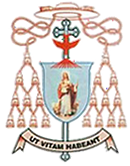- +234 9070497007
- info@archbishopvalokeke.org
5TH SUNDAY OF EASTER YEAR A
PASTORAL VISIT TO MARIST BROTHER OF SCHOOLS, NTEJE.
The Readings:
First Reading: Acts 6: 1-7.
The growth of the first Christian community and the quarrel between Greek-speakng and Hebrew-speaking disciples over the sharing of food. The problems were sorted out in a peaceful manner through the ordination of deacons. Some Jewish priests were converted.
Second Reading: 1Peter 2: 9-4.
Here, Peter compares Christians to living stones of a building, the foundation stone of which is Christ. They are a royal priesthood…
The Gospel: Jn. 14: 1-12.
Within the context of the last supper discourse, Jesus consoles his friends who were saddened by his possible exit or departure. He tells them that he is going to prepare many dwelling places for them in his father’s house.
General Comments on the Readings
In the Acts 6: 1-7, the erstwhile peaceful community of one heart and mind grew in number and crisis of management as an institution ensued. The Jews from Jerusalem and Palestine who apparently spoke Hebrew or Aramaic looked down on foreign Jews who spoke Greek as people of mixed blood.
The great lesson is the maturity of the apostles. The effect of collegiality and the principles of subsidiarity were evident. The sharing of food must have been a carryover from Judaism. As a nation, they care for the less privileged. Every Friday there were collections in the market places and buoyant homes while every day, there were house-to-house collections of money and food for the poor. The first is called the basket – Kuppak, and the second is called the tray – Tamhui. The first is distributed to the poor according to grade. However, the poorest of the poor is given enough for 14 meals, that is, till the following week. Christianity now adopted this charitable act, with adaptations, but it was being abused.
1Peter tells the audience, probably those just baptized, the nature of the community into which they are being admitted. It is a temple (i.e. House of God’s presence) made up of living stones. Christ is the cornerstone and we are built on him.
The gospel, Jn. 14: 1-12, tells us that the risen Lord continues his words and works through his Church.
Take note of these lessons including:
- Peaceful bridging of tensions between conflicting views or groups in the Church.
- The priesthood of the faithful – for all no discrimination.
- Adapting apostolic ministry to the challenges of time.
- Christ departs this earth but is now permanently with us through the Church and sacraments.
- Mature Settling of Crises: When dispute arose, they did not abandon prayer and preaching in order to share food. Peter did not decide as a sole administrator, rather the apostles as a college decided. In addition, they applied the principles of subsidiarity by allowing the people to select. All the seven selected have Greek names but they were chosen on merit.
- Christ the Son of God, the Eternal Father, the King of kings, shares his priesthood with us. In Judaism, a priest was that person of the male sex born not only of the tribe of Levi, but also of the family of Aaron (within the tribe). This regulation dates back to the post-exilic age. In the case of the priesthood instituted by Christ, not only did the Apostles not come exclusively from the tribe of Levi, but also they shared some religious functions with some men (seven men) whose choice was not based on birth or ancestral background but on character of being deeply spiritual and prudent.
Further, the prestigious title rather reserved to Israel as a chosen nation, holy priesthood… is now being applied to all the Christians. The new priesthood does not discriminate. God extends it through baptism.
- We also observe how the apostles applied wisdom and prudence to solve the problem of the time. We should learn to adapt apostolic ministry to the solution of the problems of the time.
- Christ assures the Apostles and all of us that we have a home. He has gone to prepare a place for us. Faith in Christ’s words assures us of a home. To be without faith is to be homeless and life becomes meaningless, a journey that leads to nowhere. Knowing Jesus, we are already on the way, following him we are assured of the truth, consecrating ourselves to him we share his life.
Jesus does not focus on his departure but on the joyful events that would follow. He insists that he is the way that is a terminology in wisdom tradition meaning – the manner of living: like the way of the just, the wise (Prov. 4:11). By living a life in conformity with Jesus, we arrive at God. The difficulty in understanding this he cleared by pointing to the significance of his deeds.
Let us resolve today to follow Jesus!
